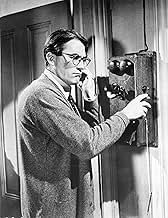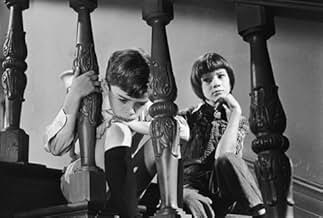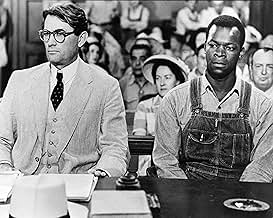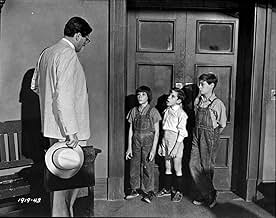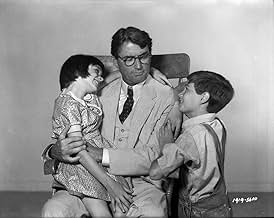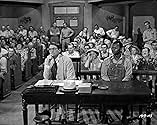Atticus Finch, um advogado no sul da era da Depressão, defende um homem negro contra uma acusação de estupro imerecida, e seus filhos contra o preconceito.Atticus Finch, um advogado no sul da era da Depressão, defende um homem negro contra uma acusação de estupro imerecida, e seus filhos contra o preconceito.Atticus Finch, um advogado no sul da era da Depressão, defende um homem negro contra uma acusação de estupro imerecida, e seus filhos contra o preconceito.
- Ganhou 3 Oscars
- 14 vitórias e 16 indicações no total
- Mayella Violet Ewell
- (as Collin Wilcox)
- Man
- (não creditado)
- Direção
- Roteiristas
- Elenco e equipe completos
- Produção, bilheteria e muito mais no IMDbPro
Resumo
Avaliações em destaque
I first read Harper Lee's lovely novel when I was a young teen, and it was one of those books that gave me an experience that changed the way I perceived the world and my own family. The movie stays true to the wonderful, innocent prose.
Every time I watch, I see my father in Atticus Finch. He, too, is a southerner who respects people and defends his beliefs. He also has always respected his children and treated us the way Atticus treats Scout and Jem. I also see other family and friends in various characters in the film, because we have such strong southern roots. Even the negative aspects of racial antipathy and loss of childish innocence bring certain memories to mind.
Those who did not grow up in the south or with southern families might not see parallels the way I do, but the movie would be a gem to anyone. Gregory Peck put in the performance of his career, and the children acted in the least forced manner I have ever seen. The cinematography is also beautiful, and the script is perfectly balanced-not too sparse, but also not dialogue heavy.
The best thing about "To Kill a Mockingbird" is that it preserves the spirit of the novel that resounds with so many people. This film stands as one of the best ever arguments for tolerance, loving families, and the beauty of life through a child's eyes. Everyone who watches movies ought to see it.
As good as it gets.
"To Kill a Mockingbird" rises to the top of the pile easily.
Yes, the courtroom proceedings are nail-bitingly engaging. But played out against the tapestry of bigotry and hate make the legal goings-on even more compelling.
The writing here is so beautiful, so lyric, so poetic. The Harper Lee-based screenplay captures wonderfully a time and a place that are absolutely real--where big brothers could solve the universe's problems in an instant and all the treasures of the world could be contained in a cigar box.
"To Kill a Mockingbird" also contains three of the most impressive child performances I have ever witnessed--there's not a false or affected moment in any one of them. Until seeing "Ponette," a movie I would highly recommend, the kids in "Mockingbird" received my best child performance ever awards. "Ponette" has ratcheted them down one notch, but that doesn't diminish the achievement here. The scene in which Scout dispels the mob simply by identifying its individual members is one of the most powerful moments in filmdom.
Peck more than deserved his best actor nod. His quiet dignity is a definite asset. Brock Peters, too, is terrific in what could have been a cliched role.
If you are a moviegoer who has a bias against black and white movies and who has therefore never seen "Mockingbird," I pity you. You've passed on one of Hollywood's most unforgettable experiences.
This is definitely one of the best films I've ever seen. Mary Badham is absolutely wonderful as 'Scout', and I think she deserves just as much credit as Gregory Peck for this picture.
The rest of the cast are great as well, and a special mention goes to Elmer Bernstein for his delicate and so appropriate score.
I love this movie and recommend it to anyone. 10/10
Você sabia?
- CuriosidadesGregory Peck's summation speech, which runs for 6 minutes and 30 seconds, was nailed in a single take.
- Erros de gravação(at around 30 mins) When Scout and Jem are debating Jem going back to retrieve his trousers from Boo Radley's, Scout can be seen mouthing Jem's lines.
- Citações
Atticus Finch: I remember when my daddy gave me that gun. He told me that I should never point it at anything in the house; and that he'd rather I'd shoot at tin cans in the backyard. But he said that sooner or later he supposed the temptation to go after birds would be too much, and that I could shoot all the blue jays I wanted - if I could hit 'em; but to remember it was a sin to kill a mockingbird.
Jem: Why?
Atticus Finch: Well, I reckon because mockingbirds don't do anything but make music for us to enjoy. They don't eat people's gardens, don't nest in the corncrib, they don't do one thing but just sing their hearts out for us.
- Cenas durante ou pós-créditosThe title is revealed in a child's crayon rubbing.
- ConexõesEdited into Passage à l'acte (1993)
Principais escolhas
Detalhes
- Data de lançamento
- País de origem
- Central de atendimento oficial
- Idioma
- Também conhecido como
- Matar a un ruiseñor
- Locações de filme
- Empresas de produção
- Consulte mais créditos da empresa na IMDbPro
Bilheteria
- Orçamento
- US$ 2.000.000 (estimativa)
- Faturamento bruto nos EUA e Canadá
- US$ 592.237
- Fim de semana de estreia nos EUA e Canadá
- US$ 357.549
- 24 de mar. de 2019
- Faturamento bruto mundial
- US$ 602.810
- Tempo de duração2 horas 9 minutos
- Cor
- Mixagem de som
- Proporção
- 1.85 : 1
Contribua para esta página








